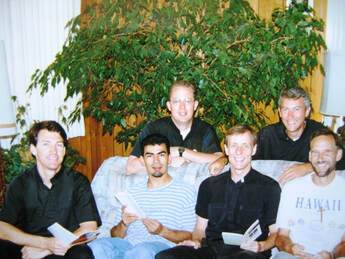 Some priests in my first priestly fraternity, in 1994.
Some priests in my first priestly fraternity, in 1994. Along with most priests, my share in the priesthood has been a steep uphill climb through the wastes of postmodernism. God has given me a strength and endurance for mountains, and I really enjoy a good climb. In the priesthood God has afforded me many stunning vistas, with the summit almost always in sight. The gradient, however, is steepening for all believers. The postmodern rejection of western intellectual principles, with its consequent disorder and violence, has the Church as one of its main “cancel” targets. Increasing opposition from outside the Church affects Church leadership from within as well.
My own experience, in three dioceses over thirty years, has been of superiors who begin with pure intentions but get mired in ecclesiastical and worldly power struggles. In 1991 the new Bishop of Stockton, Donald Montrose, wanted to do something about the abysmal catechetical establishment in his diocese. Children were getting almost no usable Catholic training in “CCD” programs, Catholics school children were abandoning the sacraments in droves after graduation, and parents knew hardly anything about the Catholic faith. He formed a catechetical institute and appointed a few zealous and well-formed priests to teach in it. But he also hired a mildly leftist nun from Los Angeles as coordinator. Within two years all of us were short-circuited by the old liberal establishment. This same dynamic has played out over and over in my time as a priest.
Priests who challenge the deeply-established spirit of the world within the Church will be always opposed and undercut. I am better aware, at this stage in my life, of my own limitations, but the fact is the Church is made of imperfect priests like me. You can’t win a war without an army, and an army is made up of men with limited capacities. How can we strengthen and support our priests in this long and demanding campaign to evangelize a Church that is ever in need of reform?
Priests need fraternal support, akin to the “band of brothers” that develops in a well-run military. The vast majority of priests do not have this, do not know how to get it, and do not even know they need it. My own parish weathered the unjust restrictions on church attendance better than most because we had five priests in the rectory who prayed twice a day together and took at least one daily meal in community. With our combined strength, we were able to find ways to provide the sacraments despite the restrictions. Without fraternal support, however, many priests—especially younger priests—will simply give up.
My own hope, on the day of my ordination, is to see bishops and priests forming supportive communities. It has been done in many dioceses, but not in most. It can be done in every diocese, and without it, we will lose many more priests, and many more souls. Please pray for this intention, and encourage your own priests and bishops to make the sacrifices necessary to form priestly fraternity.


 RSS Feed
RSS Feed